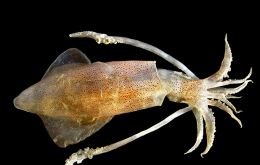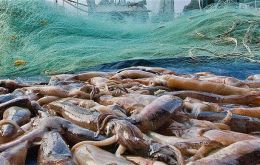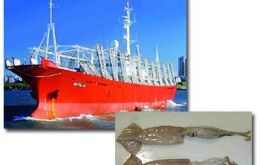MercoPress. South Atlantic News Agency
Tag: squid
-
Monday, January 22nd 2018 - 09:13 UTC
Good start for Argentine squid season: daily average catches of 28 to 35 tons

The squid fishing season in the South Atlantic, operating with Argentine licenses, has started with good prospects and a moderate optimism of the sector. During the first week jiggers reported daily average catches that oscillated between 28 and 35 tons, according to Pescare, an Argentine fish industry publication. .
-
Friday, August 18th 2017 - 09:24 UTC
Falklands: Outwitting canny fur seals feasting on abundant Loligo

Falkland Islands Senior Fisheries Scientist Dr Alexander Arkhipkin explains the habits of fur seals and the efforts undertaken to reduce by-catch in the Loligo fishery. Stocks of Falkland calamari (Loligo) are very prolific this year.
-
Tuesday, December 13th 2016 - 16:17 UTC
Sorry, “no fish and chips, what about some squid and chips”; UK waters warming

The traditional British fish supper could be replaced by the likes of squid as the waters around the UK's shores grow warmer, say government scientists. Squid and other fish that thrive in warmer waters, such as sardines and anchovy, are flourishing around the North Sea, according to fisheries data. Squid are now being caught at 60% of survey stations in the North Sea, compared with 20% in the 1980s, but the likes of cod are heading north, away from British waters.
-
Monday, February 1st 2016 - 07:00 UTC
Spanish scientists analyze European and veined squid diets

A group of Spanish scientists has analyzed for the first time the European and veined squid diet in the Mediterranean. European squid (Loligo vulgaris) and veined squid (Loligo forbesii) are two morphologically nearly identical species that inhabit the Atlantic Ocean and the Mediterranean.
-
Thursday, July 3rd 2014 - 06:45 UTC
Argentine squid industry concerned with a significant drop in prices

A significant decline in catches of squid (Illex argentinus) in Argentine waters at the end of the season, has forced the return to port of several Argentine flagged jiggers, according to a report this week from the country's Coast Guard station in Mar del Plata.
-
Friday, June 20th 2014 - 06:29 UTC
Antibiotic-resistant “superbug” detected South Korea raw squid

A dangerous antibiotic-resistant “superbug” has been found in the North American food supply for the first time, according to researchers from the University of Saskatchewan.
-
Wednesday, May 7th 2014 - 01:44 UTC
Falklands: Slow start but sprint finish for 2014 squid fishery

In the last 25 years, the squid fishery has been one of the major contributors to the economy of the Falkland Islands. It is unique in the world as about 80 per cent of the total annual catch is squid. Both Illex and Loligo squid have annual life cycles, with a new generation recruiting into the fishery every year
-
Monday, March 31st 2014 - 12:01 UTC
Falklands reports record catches of Loligo and Illex squid

Falkland Islands is reporting record catches of Illex and Loligo squid this season. News first arrived last Sunday when it was announced that local jiggers had caught the highest daily catch and highest catch rate of Loligo squid since at least 2000.
-
Thursday, March 27th 2014 - 08:19 UTC
Peruvians encouraged by the squid potential in the area recovered from Chile

The 50,000 square kilometers of maritime space Peru gained from the favorable ruling by the International Court of Justice in The Hague, on the border dispute with Chile, have a potential fishing activity that includes 200,000 tons of Peruvian squid, according to the country's Sea Institute, (Imarpe).
-
Tuesday, February 11th 2014 - 08:48 UTC
Argentine fisheries exports recovered in 2013 with an increase in volume and value

Argentina fisheries exports reached 1.495 billion dollars last year which represents an 11.3% increase in value and 14.9% in volume compared to 2012, according to a report from the private consultant Investigaciones Economicas Sectoriales, IES. Squid played a leading role by doubling catches in 2013 with an extended season.
